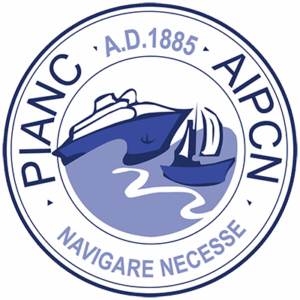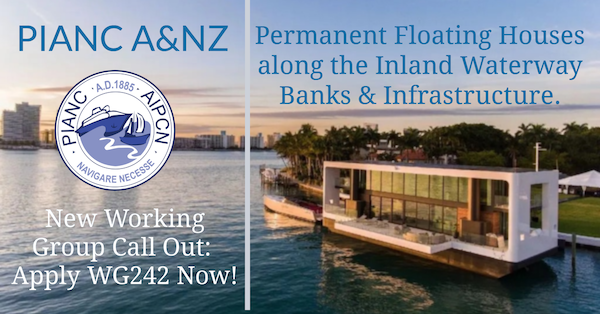PIANC A&NZ Members are invited to apply for participation in a new PIANC International Working Group. InCom WG242 Permanent Floating Houses Along The Inland Waterway Banks And Infrastructure.
From a navigational and economic point of view, in general waterway authorities are not keen on mooring floating houses along main waterways. Yet floating houses are for a large part the result of a societal problem, namely the shortage of (affordable) houses, and/or a trend to live close to the nature.
Objectives of the Working Group
The aim of the working group concerns the use of riverbanks by floating houses and more specifically:
• To provide a broad context of floating structures for residential and hospitality uses, state of the industry and basic engineering considerations;
• To analyse experience of floating houses available along riverbanks. What about public acceptance?
• To outline the ways these permanent floating houses can be introduced along river banks, including the demand of the customers (i.e. floating home owners/users);
• To evaluate the potential conflicts of the floating houses along the river banks with the commercial navigation and for the river flow control;
• To evaluate the potential conflicts with long term development (debris at bottom of the rivers which obstruct the flow)
• To describe the best administrative practices to review applications to authorise, develop, and manage this kind of permanent housing along riverbanks
How to Apply
If you would like to represent the Australian & New Zealand National Section of PIANC on this Working Group please apply to the A&NZ Board.
Please advise if you qualify as a Young Professional (YP – 40 years or younger) as there are two positions available in each Working Group, one of which is for a YP.
Many of our members are currently active on a number of PIANC Working Groups and they do produce significant outcomes that benefit maritime matters in our region.
How to Apply:
Please forward your application before COB Friday 24 June 2022 to:
Greg Britton, (Technical Commission Lead A&NZ) E: greg.britton@rhdhv.com
Your application should include a detailed CV/Resume with a short covering letter outlining:
1. Your experience in the particular technical field;
2. Why the WG is relevant for the Australian / NZ content and the direct benefits of participation;
3. A commitment that you will prepare (for distribution to all members) a short report providing an overview & outcomes of the WG etc;
4. Whether or not you are seeking to access Travel Assistance Policy (TAP )funding; and
5. Whether you qualify as a Young Professional.
All nominations must be received no later than 24 June 2022
Eligibility:
Please note that Working Group Members need to be Individual Members of PIANC, working for a Corporate Member or Platinum Partner, be an invited expert or a be a member of a Sister Organisation.
Process:
A Selection Committee will review all nominations received and make a final recommendation to the PIANC A&NZ Chair.
Responsibilities:
Please be aware that membership of a Working Group does require your active participation. This includes attending Working Group meetings (pre-Covid -19 this was usually at international locations) or as a ‘Corresponding Member’ if you do not want to undertake the normal travel requirements of full membership. If you are expert in the field and would like to influence the outcome of the Working Group we encourage you to participate as fully as you are able.
Costs:
All costs associated with membership must be borne by either yourself or your employer, however PIANC Australia & New Zealand has a Travel Assistance Policy to partially assist with travel & attendance at Working Group meetings, in order to promote Australian and New Zealand technical input into these important WG activities.
Under the PIANC A&NZ Travel Assistance Policy (TO), up to $2,000 funds may be payable post travel upon the successful completion of a WG Summary Report and production of relevant travel receipts.

